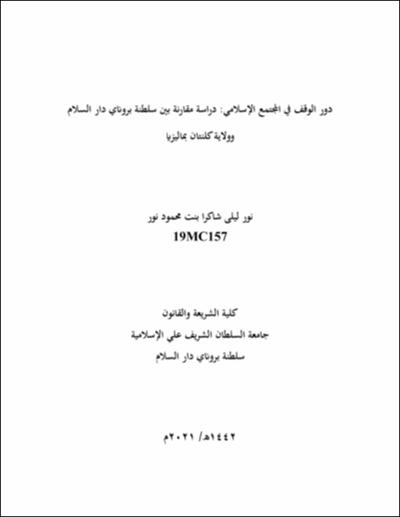| dc.description.abstract | This study discusses the situation of waqf in Brunei Darussalam and the state of Kelantan, Malaysia. The four chapters of study describe the Islamic perspective on waqf, its history and development, the role of waqf in the Muslim community in Brunei and Kelantan, as well as the differences in waqf institutions in these two regions. The first chapter of the research focuses on waqf in Islam, its requirements as well as the types of traditional and contemporary waqf. The second chapter presents the status of waqf in Brunei Darussalam, while the third chapter explains about waqf in the state of Kelantan, Malaysia. The final chapter of this research, in fourth chapter, describes the differences in waqf institutions practiced between Brunei Darussalam and the state of Kelantan, Malaysia. The problem in this study is that waqf institutions in Brunei and Kelantan are still not widely practiced due to lack of response and understanding of the local community about the importance and advantages of waqf, while in other countries, waqf institutions have actively grown and developed, such as in Turkey, Singapore, and others. The purpose of this study is to identify the concept of waqf practiced in both regions. Information, data and research documents obtained using two types of methodologies, namely Library Studies and Interviews of Religious Council officers in both regions. According to the findings obtained, waqf in Brunei is still quite limited. Similarly in the state of Kelantan, Malaysia, the waqf situation seems to be the same with no substantial difference than Brunei Darussalam but the state of Kelantan is a little more advanced in developing waqf institutions in its state. In addition, this study also provides new ideas for Brunei Darussalam and Kelantan to maximize the existing waqf property such as investing it in the form of shares or a more diversed corporate waqf. | en_US |



